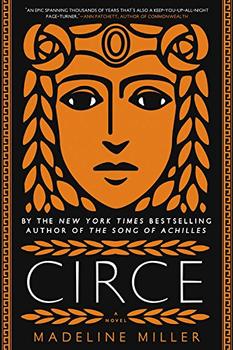Summary | Excerpt | Reviews | Beyond the book | Read-Alikes | Genres & Themes | Author Bio

The End of the Gods
by A.S. Byatt"In fairy stories - if you accept the bloody violence, and the horrible things that happen to the bad characters - the point is a pleasurable and satisfactory foreseen outcome, where the good survive and multiply and the bad are punished...," A. S. Byatt writes in her afterword to her retelling of the Norse myth of Ragnarök, explaining why her childhood self responded so strongly to this myth. "Myths are often unsatisfactory, even tormenting... The fairy stories were in my head like little bright necklaces of intricately carved stones and wood and enamels. The myths were cavernous spaces, lit in extreme colours, gloomy, or dazzling, with a kind of cloudy thickness and a kind of overbright transparency about them."
Certainly the Norse myths as Byatt retells them here feel both cavernous and bright, gloomy and dazzling, populated with wildly imaginative creatures, dark plots, and complicated stories of vengeance and betrayal. And the good - whoever they may be - certainly don't "survive and multiply," because no one, not even the most powerful god, survives at all.
Byatt's framing story for the Norse myths is that of "a thin child, who was three years old when the world war began." Sent from London to the countryside at the start of the Blitz, the girl (who, Byatt reveals in her afterword, is more or less her childhood self) lives out her youth amid a world she's convinced is going to end at any time. The war will never cease, her father will never return home from fighting, and the world as she knew it before the war will - quietly or spectacularly - come to an end.
The story of Ragnarök - in which an epic battle is prompted by the god Loki's murder of the beloved god Baldur - is, after all, about the end of all things. Byatt also, however, includes the Norse myths' origin stories, about how the world came to be and how the worlds of the gods (Asgard) and of men (Midgard) are ordered and arranged. Byatt, whose attention to minutiae has been a hallmark of her earlier work (especially her most recent, The Children's Book), writes about creation and the bounties of the world in extravagant detail, as when she describes the world-encircling snake Jörmungandr's journey through the world's seas: "She surged round the world, from icy pole to icy pole, or through the hot oceans under the burning sun. She swam under ice-shelves, in aquamarine tunnels and spyholes, fastening her fangs on the wings of a diving albatross, spitting out the matted fur of a seal pup."
Likewise, Byatt's thin child delights in the natural world, a pastoral one that already seems a distant past to most twenty-first century readers: "It was all one thing, the field, the hedge, the ash tree, the tangled bank, the trodden path, the innumerable forms of life, of which the thin child... was only one of many." Part of Byatt's point - masterfully integrated into the narrative itself without seeming preachy or even overt - is to point out the ways in which humans, in our god-like arrogance and inability to foresee the future, have poisoned this world, perhaps irreparably. "We are a species of animal," Byatt writes in her afterword, "which is bringing about the end of the world we were born into."
Like myth itself, Byatt's retelling of the Ragnarök story can feel unsatisfactory, or at least unsettling, failing to offer readers a tidy conclusion or a happy ending (Byatt even comments that although some versions of this extremely dark story tack on concluding narratives or rebirth or resurrection, this is likely an imposition of Christian sensibilities on a most un-Christian story). Instead, it will continue to unsettle readers long after its final page, prompting reflections on the inevitability of mortality - both personal and global - and on the power and potential of a fundamentally flawed species to change behaviors before it's too late.
![]() This review was originally published in The BookBrowse Review in February 2012, and has been updated for the
April 2013 edition.
Click here to go to this issue.
This review was originally published in The BookBrowse Review in February 2012, and has been updated for the
April 2013 edition.
Click here to go to this issue.

If you liked Ragnarok, try these:

by Heather O'Neill
Published 2025
From the hugely acclaimed author beloved by literary lights, including Emily St. John Mandel, Kelly Link, and Mona Awad, a dark dystopian fairytale about an idyllic country ravaged by war—and a girl torn between safety and loyalty.

by Madeline Miller
Published 2020
Winner of the 2018 BookBrowse Fiction Award
The daring, dazzling and highly anticipated follow-up to the New York Times bestseller The Song of Achilles.
A library is thought in cold storage
Click Here to find out who said this, as well as discovering other famous literary quotes!
Your guide toexceptional books
BookBrowse seeks out and recommends the best in contemporary fiction and nonfiction—books that not only engage and entertain but also deepen our understanding of ourselves and the world around us.